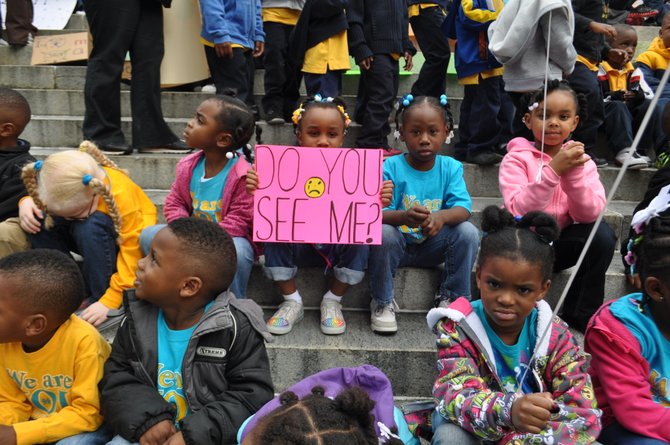Child-care center providers rallied against a new state program that forces some low-income parents to use finger scanners. Photo by Trip Burns.
Angry and disappointed—that's how child-care center operator Petra Kay described how she feels about the way a state agency has handled implementation of a new tracking system for children of low-income families.
Kay, who owns Northtown Child Development Center in Jackson, questioned the wisdom of giving millions of taxpayer dollars to corporate giant Xerox for a new system that requires parents receiving federal child-care assistance to scan their fingers when dropping off or picking up their children.
"We are developing a child-care beef plant," Kay said, referring to a failed meat-processing plant that received millions of dollars in state loans before the project went belly up, leaving taxpayers on the hook.
In September, the Mississippi Department of Human Services, which oversees several programs for low-income families, launched a pilot program at about 20 child-care centers in the Jackson metro area. DHS said the new system would increase efficiency and ultimately help enroll more children whose families can't afford to pay the full cost of child-care out of their pockets.
More centers were scheduled to go online Nov. 1, but the scanners prompted a firestorm of complaints from child-care-center directors who said the system is prone to technical glitches and that the costs of having a staff member monitor the machines bit into revenues. They also had concerns about personal-information security and privacy with the system.
After an October hearing, child-care-center owners sought a temporary restraining order against implementing the scanners through Hinds County Chancery court, but the court declined to issue a TRO. Instead, DHS agreed to hold a second public hearing, which took place Friday in Jackson, and to issue an economic-impact statement on the scanner program.
The document provides insight into DHS' decision to launch the $12.7 million finger-scanning program. According to the impact statement, the program could "reduce improper payments, reduce fraud, improve overall efficiency and increase the number of children being served."
Specifically, the report states that the finger scanners could save between $1.6 million and $2.2 million in administrative costs and $15 million to $18 million in false child attendance claims.
Jane Boykin, of Delta Licensed Providers, accused DHS of not acting in good faith by suggesting that millions of dollars in fraud is taking place without providing any documentation.
Providers were dubious about claims that the system would cut down on fraud and waste. Boykin, one of several providers who spoke at a recent public hearing, also called out Jill Dent, DHS' office for children and youth director.
Dent previously allayed suspicions of providers that the finger scanners could be linked to law enforcement or child-support payment systems by saying the scanners would not be linked to any other computer database. However, DHS' economic-impact statement touts the finger scanner software's ability to work with the Electronic Benefits Transfer, or food stamp, system.
Forcing low-income parents and their designees, many of whom are minorities, to have their fingers scanned drew rebuke from families and the day-care centers because the practice seemed similar to police fingerprinting. Providers have also said that the scanning system itself discriminates against some centers because participating in the program requires providers to have a dedicated phone line and a checking account, which poor and minority-owned centers are less likely to have.
"Once again, we are using a white yardstick to measure a predominantly minority child-care system," Boykin said.
Dent, speaking with reporters after the public hearing at Mississippi Public Broadcasting auditorium, responded to a question from the Jackson Free Press about the prevalence of fraud in the certificate program by referring to a 2007 recommendation by the office of then-Auditor Phil Bryant to improve the program's efficiency.
"We just want to make sure we have accountability in our system," Dent said.
Dent also said the Division of Child Care and Development, which DHS oversees, has issued more than 1,000 new certificates since launching the pilot program in September and plans to send more letters to parents on the waiting list.



Comments